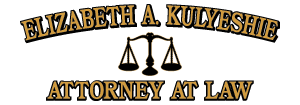
Call us today for a Free Legal Consultation
(570) 784-3400
Practicing Law in Bloomsburg and the following areas:
- Danville
- Berwick
- Williamsport
- Lewisburg
- Sunbury
- Wilkes-Barre
- Pottsville
- Mt. Carmel
Employment Law
- Unemployment Compensation Appeals
- PHRC / EEOC
- Discrimination
- Harassment
Elizabeth Kulyeshie represents employees who have been denied unemployment compensation, wrongfully discharged or subjected to harassment or discrimination in connection with their employment.
These cases are highly complex and require specialized knowledge. Our experience with the law and procedures of the administrative agencies that investigate these claims ensures that employees' rights are protected. We represent employees in proceedings before Unemployment Compensation Referee's, Board and Commonwealth Court, the Pennsylvania Human Relations Commission, and the United States Equal Employment Opportunity Commission.
Employment law consists of thousands of Federal and state statutes, administrative regulations, and judicial decisions. Many employment laws were enacted as protective labor legislation. Other employment laws take the form of public insurance, such as unemployment compensation. She aggressively represents employees in claims in state courts.
Unemployment Compensation Appeals
Unemployment compensation benefits are important to your life. Despite a relatively straightforward application process, future procedures can be complicated and emotionally tiring. I hope this guide provides you with a basis for such knowledge and the strength to stand up for your claim.
1. Need for an Attorney
If you have a hearing with a Referee, due to an appeal, it is important to retain an attorney. If you do not yet have an attorney, you should call the hearing office to schedule a continuation in order to find legal representation. The following points provide a few examples to the importance of legal representation: Each claim may have its unique procedural concerns (i.e. Employer does not file, notice is not reasonable) and reasons for appeal (i.e. the employer makes specific accusations about your work performance). There are nuances in every claim and an attorney can help you with procedural motions and a defense strategy based on existing case law. Emotions can run high at a hearing and it is important that an attorney control the presentation of your claim. An attorney is trained to counter the employer's argument with a set of facts and a persuasive story. An attorney is trained at cross-examining the employer and their witnesses.
2. The Initial Process
After initialing filing your claim for unemployment compensation benefits, a Notice of Financial Determination, Form UC-44(f), is sent to the claimant and the employer. This form is only used to determine the claimant's financial eligibility by determining if enough wages have been paid for eligibility. The employer will also receive a part of the claimant's application that discusses the reason for termination. The Notice of Application and Request for Separation Information, Form UC-45, is a a requirement for the employer to fill out. If the employer does not respond, the Unemployment Compensation Service Center will make their decision based on the original information provided by the claimant.
3. The Initial Process, Part II
If the employer disputes the claimant's explanation for the termination, the claims examiner will further investigate the dispute by contacting the employer. After this further investigation, the examiner will issue a Notice of Determination, Form UC-44, which will briefly explain the examiner's reason for determining the claimant's eligibility or ineligibility. The employer or claimant may appeal this decision. The appeal must be made within 15 days of the date the determination was mailed.
4. Appeal of Notice of Determination
The Notice of Determination, when mailed, includes a Petition for Appeal, Form UC-46(B). This form, or a suitable written objection, will be allowed to appeal the decision. This appeal then starts a "Referee Hearing", where you will be able to defend your claim.
5. Referee Hearing
A referee hearing sis held in the county where the employee regularly reports for work or another suitable place when the employer and claimant can agree. A Pennsylvania referee hearing is a much less stringent and informal "trial", although there is still the ability to cross-exam sworn witnesses. You are able to present your argument, bring evidence and witnesses, and rebut your opponents presentation. The standard of proof in a hearing is a "preponderance of the evidence", similar to regular civil proceedings. Evidence rules, that are normally very stringent in civil and criminal trials are somewhat relaxed. It is important, however, to have your attorney object to specific adverse evidence as if it were a trial in order to establish a record for appeal. For example, the hearsay objection may be modified, if not properly objected to, in a Pennsylvania referee hearing in order to corroborate a finding of fact.
6. Referee Hearing, Part II
At a Pennsylvania referee hearing, the referee seeks to evaluate the evidence and witness in the claim. The referee will determine the order and admission for the evidence that shall be presented. Remember: referees, on average, hear hundreds to thousands of cases a year and the individual attention you are provided is generally only at your particular hearing.
7. Appeal of Referee Decision
Again, you have 15 days to appeal a decision of the Referee within 15 days from the date the decision was mailed. The appeal must be specific in its grounds for appeal, not simply that you "disagree with the decision." The appeal goes to the Unemployment Compensation Board of Review (UCBR), which is comprised of 3 members. Although oral arguments are possible before the UCBR at their discretion, their caseload generally does not allow any oral arguments. The UCBR may review the appeal on the evidence provided at the Referee's hearing or it may request additional information. The UCBR may make take any of the following actions: 1) Remand the case for another hearing, or 2) Affirm, modify, or reverse the determination of the Referee.
8. Appeal of the UCBR
An appeal of the UCBR's decision is possible, but generally rare and is outside the scope of this guide. it is recommended that you contact a qualified Pennsylvania unemployment compensation attorney for more details. These next steps include an Appeal to the Commonwealth Court and a Petition for Allowance of Appeal to the Pennsylvania Supreme Court.
9. Telephone Hearing
Although the Commonwealth prefers an in-person hearing, you may have a telephone hearing by submitting a motion if you are over 50 miles from the place of the hearing or you have a "compelling problem" (i.e. health, transportation issues, etc.) that prevents you from attending. You are allowed representation of an attorney via telephone and you should receive instructions and rules regarding a telephone hearing.
10. Quitting/Voluntary Termination
If you voluntarily quit your job, you may still be able to file for unemployment. If you voluntarily quit your job for "good cause", you should file for unemployment and/or fight an appeal. The burden of proof is on you, the claimant, to prove that you voluntarily quit for "good cause" and that the cause was real, substantial, and you had no other alternative. In general, a "good cause" voluntary termination must be supported by your notification of the issue to the employer, the following of their internal procedures for such problems, and affording the employer an opportunity to find alternative solutions.
11. Employer's Basis for Denying the Claim
Employers generally deny a claim on the basis of "willful misconduct". This standard means "an act of wanton or willful disregard of the employer's interests, the deliberate violation of rules, the disregard of standards of behavior which an employer can rightfully expect from an employe, or negligence which manifests culpability, wrongful intent, evil design, or intentional and substantial disregard of the employer's interests or of the employe's duties and obligations." The burden is on the employer to prove the "willful misconduct". This is generally done through testimony, performance reports/evaluations, or conduct notices. There are numerous examples or accusations that an employer may claim for willful misconduct and each case is fact driven by the individual circumstances. Some classifications for denying the claim include absenteeism/tardiness, deliberate rule violation, refusal to follow a directive, attitude toward employer, and disruptive influence, among others.
Employment Discrimination PHRC/EEOC
Employment discrimination happens in the job recruiting or hiring process or in the workplace. It happens when employment decisions such as hiring, layoffs, pay or other work terms or conditions are based on factors other than qualifications or job performance.
Who is protected?
For employment discrimination to be illegal in PA, it must be based on someone's race; color; sex; age (over 40); ancestry; national origin; religious creed; having a GED rather than a high school diploma; handicap or disability, or the use, handling or training of a guide or support animal for disability or relationship to a person with a disability. In hospital and healthcare settings, it is illegal to discriminate against employees based on their participate in or refusal to participate in abortion or sterilization procedures.
Discrimination based on other factors may be unfair or unethical, but not specifically prohibited by law.
It is important to know that it is also illegal to discriminate against someone because they have opposed illegal discrimination, filed a complaint, or assisted in an investigation. This is called retaliation, and the law protects those who oppose illegal behavior.
Who commits employment discrimination?
You may be the victim of discrimination by a boss, supervisor or co-worker, but a specific person is not always the offender. A company's policies or practices or the way they are applied may be discriminatory.
In employment, PA law applies to companies with four or more employees, and does not apply to federal agencies, law enforcement agencies and certain other entities.
Examples of discriminatory actions*:
- firing or demoting someone based on factors* other than job performance
- lowering someone's pay or paying them less than a co-worker with a comparable job
- applying a policy that negatively affects one group of people more than others (i.e. hurts only women or only men; or hurts a minority group or people of a specific religion or national origin)
- offering different discipline, work terms, conditions, benefits or pay to one group* than to others
- refusing to make a reasonable accommodation for a worker with a disability
*Remember, for discrimination to be illegal, it must be based on the characteristics or factors listed in the second paragraph on this page. These factors are sometimes called "protected classes."
Employment discrimination includes discriminatory job ads, racial harassment, sexual harassment, unequal pay, age discrimination and pregnancy discrimination among many other examples.
If you have been negligently affected in your employment, I can assist you in evaluating your case. Call and set up a free case evaluation.
Contact Us by Email
We will never share or sell your email address or phone number.
